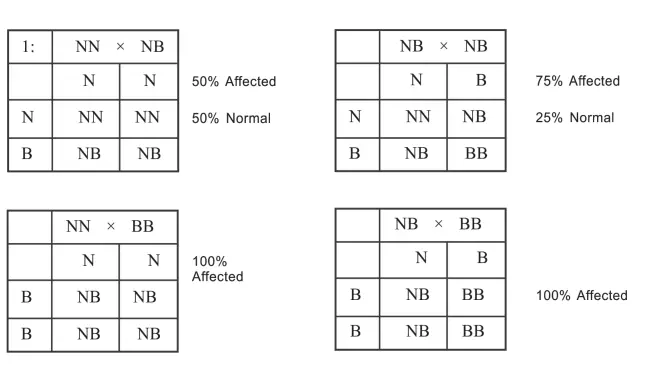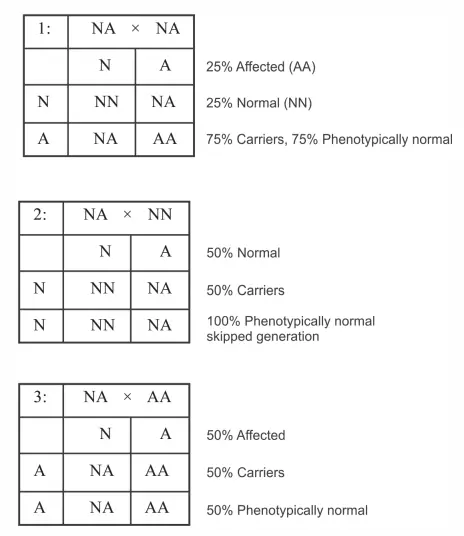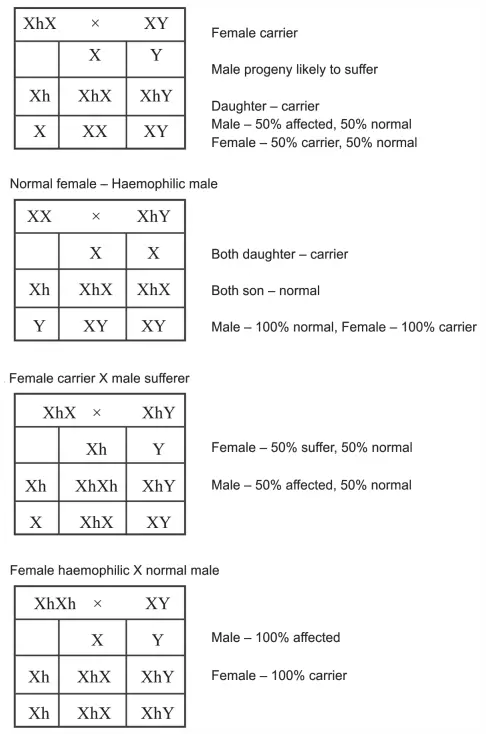Mendelian Genetics
Autosomal dominant inheritance
1. Characters: Commonest mating normal with heterozygote
Table of Contents
- The parents show the trait.
- There is horizontal and vertical transmission (50% affected).
- The trait appears in each generation with no skipping.
- A normal (unaffected) individual does not carry the gene and does not transmit the trait.
- No sex predilection.
Read And Learn More: General Histology Question And Answers
2. Autosomal dominant traits:
1. Achondroplasia
2. Brachydactyly

3. Huntington’s chorea—late expression.
4. Osteogenesis imperfecta.
5. Syndactyly.
Autosomal recessive inheritance
1. Characters:
- Common mating: Two carriers 25% affected, i.e. no horizontal transmission.
- The trait seen only in sibs, not in parents.
- There is vertical transmission with skipped generation.
- The carriers look normal.
- There is no sex predilection.
- Parents are from consanguineous marriage
Commonest mating NA x NA:

2. Many inborn errors of metabolism: Fried Potato And Garam CHAWAL MAST Hai says Our Bangalore
- Friedreich’s ataxia
- Phenylketonuria
- Alkaptonuria
- Gastroschisis, Gaucher’s disease, Galactosaemia
- Congenital adrenal hyperplasia, Cystic fibrosis, Carpenter disease
- Heartburn disease, Haemochromatosis, Homocystinuria
- Abetalipoproteinaemia
- Wilson’s disease
- Albinism
- Lysosomal storage disease
- Muscular dystrophy
- Acute fatty liver of pregnancy
- Sickle cell disease, situs inversus
- Thalassaemia, Tyrosinaemia
- Hurler’s syndrome
- Bloom’s syndrome
X-linked recessive traits
1. The X-linked recessive traits are:
- Hemophilia.
- Color blindness.
- Duchenne muscular dystrophy.
- Hydrocephalus.
2. Characters:
- The females ♀ are carriers and the males ♂ are sufferers.
- There is no direct transmission from father to son.
- Zigzag transmission, i.e. one generation escapes and the trait appears in the next generation
- The carriers show affection in milder form.
- The females ♀ are rarely affected. Affected female ♀ is produced usually by consanguineous marriage between carrier female ♀ and affected male ♂
- The carrier with Turner’s syndrome will suffer.

Leave a Reply